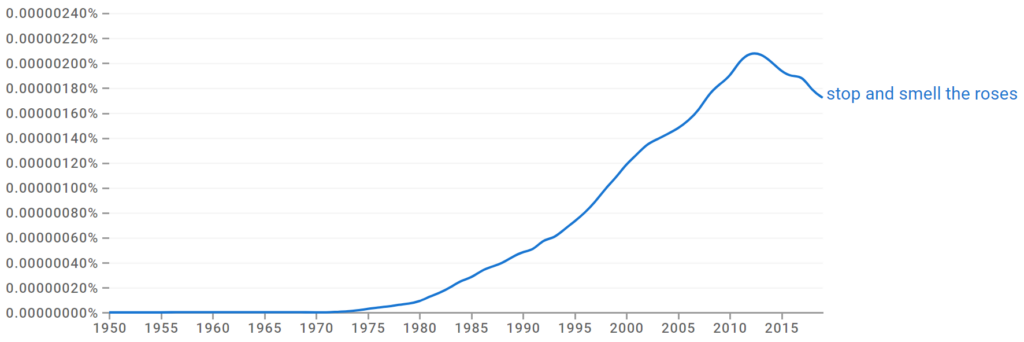Stop and smell the roses means to slow down, relax, and, in general, enjoy life. Its idiomatic use is synonymous with finding happiness in the present moment.
Idioms, like stop and smell the roses, are phrases that have a different meaning from the actual words used. They make the English language more fun and interesting. They help us say big ideas in a simple, short way. Knowing idioms helps us understand and enjoy conversations and stories better.
This article provides a detailed understanding of the figurative and literal meaning, origin, and usage of this expression, enriched by various examples. Keep reading to understand what stop and smell the roses means and how to apply it to your material.
What Does the Idiom Stop and Smell the Roses Mean?
The idiom stop and smell the roses is an admonition to slow down and enjoy life, to take the time to savor the beauty around you, and to relax. It conveys the idea of taking time to appreciate and enjoy the present moment and finding joy and beauty in the small details of life. It promotes an approach to life that values the quality of experiences over the quantity of achievements.
For instance, during a busy week of exams, I noticed my students growing increasingly stressed. I reminded them, “I know you all want to do well but don’t forget to stop and smell the roses. Take breaks and enjoy your favorite hobby. Remember, life isn’t just about grades.”
Literal Meaning
The literal meaning of stop and smell the roses involves physically pausing to inhale the fragrance of roses or other flowers you might pass. It infers that you slow down without explicitly stating it.
Figurative Meaning
The figurative meaning of stop and smell the roses is to relax or to take time out of one’s busy schedule to enjoy or appreciate the beauty of life.
Variations
Here are some variations of the idiom stop and smell the roses:
- Stopping to smell the roses
- Take time to smell the roses
- Stop and smell the flowers
- Wake up and smell the roses
- Take time to smell the roses
- Stopping and smelling the flowers
- Woke up, smelled the roses, and started enjoying life more
How Is Stop and Smell the Roses Commonly Used in Context?
If you need help with how to use the expression, consider the following examples of usage to help you understand how it fits into the context of a sentence.
What Are the Different Ways to Use Stop and Smell the Roses?
The phrase stop and smell the roses can be used in various ways, often to advise or remind someone (or oneself) to relax and enjoy life. Here are a few examples:
- Advice for relaxation: You’ve been working so hard lately. It’s essential to take some time for yourself and just stop and smell the roses.
- Reminding someone to appreciate life: Life can be hectic, but remember to stop and smell the roses along the way. It’s the little moments that make it worthwhile.
- Encouraging mindfulness: Instead of constantly rushing, try to be present in the moment. Stop and smell the roses, and you’ll notice the beauty around you.
- Reflecting on priorities: Sometimes, we get caught up in our busy schedules and forget what truly matters. We must stop and smell the roses to remind ourselves of what brings us joy.
- Encouraging gratitude: Even during challenging times, there are still things to be grateful for. Take a moment each day to stop and smell the roses, appreciating the blessings in your life.
- Inspiring a balanced lifestyle: It’s crucial to balance your responsibilities and take time to stop and smell the roses.”
- Reminder to slow down: Life moves quickly, but it’s essential to slow down and enjoy the journey. Don’t forget to stop and smell the roses along the way.
- Encouraging self-care: Amidst all the demands and pressures, don’t neglect yourself. Take breaks, indulge in self-care, and stop and smell the roses to recharge.
Where Can You Find Examples of Stop and Smell the Roses?
Examples of the phrase stop and smell the roses are most commonly found in situations that offer advice and support. Literature, song lyrics, conversations, social media, and inspirational quotes or memes are more likely to include this expression than formal situations.
Here are some modern conversational examples found in newspapers:
- Everyone is so busy all the time, doing this and doing that, and I think this has given people a chance to stop and smell the roses. (Volleyball Magazine)
- Watching her work gave me an understanding of business, but also taught me to work hard, appreciate individuals, and to stop and smell the roses. (The San Antonio Business Journal)
- The phrase “stop and smell the roses” is often used to tell someone to relax, take a beat and enjoy or appreciate the beauty of life. (The Sand Mountain Reporter)
What Are Some Tips for Using Stop and Smell the Roses Effectively?
To effectively use the idiom stop and smell the roses, it’s important to understand a few key guidelines. Here are five tips to help you use this phrase more effectively:
- Understand the context: This phrase is usually used to remind oneself or others to slow down and appreciate the simple, beautiful moments in life. Use it when the context involves busyness, stress, or overlooking life’s pleasures.
- Use it sparingly: As with any idiomatic expression, do not overuse it. It can lose its impact if used too frequently.
- Consider your audience: While many English speakers will understand this phrase, it might be confusing for some non-native English speakers. Be mindful of this when using it.
- Pair with relevant examples: When using this idiom, exemplify the context by citing instances where one can stop and smell the roses, such as enjoying a sunset, spending time with loved ones, or appreciating a good meal.
- Use it in the right tense: The phrase can be adapted for different tenses, like stopped and smelled the roses (past tense) or stopping to smell the roses (present continuous tense), depending on the context.
What Is the Origin of the Idiom Stop and Smell the Roses?
The origin of the phrase stop and smell the roses is generally attributed to Walter Hagen. He was a famous golfer who published a book in 1956 called The Walter Hagen Story. In it, he said, “You’re only here for a short visit. Don’t hurry. Don’t worry. And be sure to smell the flowers along the way.”
The quote became rather famous due to its motivational and inspirational qualities. An interpretive license was taken to shorten the sentence to “stop and smell the flowers” and “stop and smell the roses.”
In 1974, “Stop and Smell the Roses” was a popular song title by Mac Davis that peaked in the top 10 on the song charts. “Stop and Smell the Roses” was also the name of a solo studio album released by The Beatles drummer, Ringo Starr, in 1981.
How Did the Idiom Evolve Over Time?
The idiom evolved naturally from the idea that one should slow down and enjoy the flowers. The idea may be associated initially with Walter Hagen. However, it is likely that similar sentiments were often used, and he simply provided a simple way to express an idea that resonated with many people.
What Are Famous Quotes Using Stop and Smell the Roses?
The exact phrase stop and smell the roses is not commonly associated with specific famous quotes. Here are a few variations or similar quotes that convey a similar sentiment often found in inspirational speeches and pop culture:
- Stop and smell the roses. Life is short. Enjoy the simple things.
- Inhale the future, exhale the past, and stop and smell the roses along the way.
- Life moves pretty fast. If you don’t stop and look around once in a while, you could miss it. (Ferris Bueller’s Day Off)
- Enjoy the little things, for one day you may look back and realize they were the big things. (Robert Brault)
What Are Some Related Words, Terms, or Phrases to Stop and Smell the Roses?
We’ve listed the common synonyms, antonyms, and other phrases that can help you better understand the use of the idiom stop and smell the roses.
Synonyms
These expressions emphasize the importance of slowing down, being mindful, and finding happiness in the simple things.
- Enjoy the moment
- Embrace the present
- Savor the beauty
- Pause and delight
- Take a moment to relish
- Slow down and savor
- Find joy in the simple things
- Take time to appreciate
- Revel in the beauty
- Delight in the small wonders
- Cherish the little pleasures
- Pause for gratitude
Related Terms, Idioms, and Phrases
Here are some related terms, idioms, and phrases for stop and smell the roses:
- Take a breather
- Slow down
- Enjoy life
- Live in the moment
- Carpe Diem (a Latin phrase meaning ‘seize the day’)
- Don’t rush
- Take it easy
- Appreciate the small things
- Mindfulness
- Life’s simple pleasures
Antonyms for Stop and Smell the Roses
These antonyms highlight rushing, neglecting the present, and failing to appreciate the simple joys of life that stop and smell the roses encourage.
- Rush and miss the beauty
- Neglect the small joys
- Ignore the present moment
- Dismiss the simple pleasures
- Overlook the beauty around you
- Be too busy to enjoy life’s moments
Misinterpretations and Misuses of Stop and Smell the Roses
To avoid misinterpretations, it’s crucial to provide context when using the phrase stop and smell the roses. Take a look at common reasons the expression might be misused or misunderstood:
- Literal interpretation: One possible misinterpretation is taking the phrase literally, suggesting that the sole purpose is to stop and smell actual roses.
- Perceived laziness: Some individuals may interpret it as an excuse to avoid responsibilities or work rather than as a reminder to find balance and appreciate life’s simple pleasures.
- Ignoring challenges: Another misinterpretation could involve using the phrase as a means to disregard or ignore challenging situations.
- Dismissing ambition: In certain contexts, the expression might be misconstrued as advocating for contentment without pursuing personal growth or striving for goals.
- Overlooking urgency: In situations where urgency is required, misinterpreting the phrase might lead to neglecting time-sensitive matters.
What Have We Learned About Stop and Smell the Roses?
The idiom stop and smell the roses promotes the significance of life’s simple pleasures and the present moment. As an essential part of the English language, idioms like this not only add color to our conversations but also encapsulate profound ideas in an engaging manner.
It came into use in the 1950s. It’s a rephrasing of a sentiment found in an autobiography written by Walter Hagen: “Don’t hurry. Don’t worry. And be sure to smell the flowers along the way.” This passage was soon paraphrased as stop and smell the roses.



